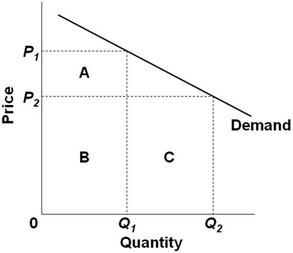How is the utility of a gamble to a risk averse person different from that to a risk neutral person?
For a risk averse person the expected utility derived from the wealth invested in a gamble is always lower than the actual utility derived from the wealth. He would be ready to pay someone to take the gamble away from him. On the other hand, a risk neutral person is indifferent between taking or avoiding a gamble with a zero expected return.
Economics
You might also like to view...
In the United States from 1960 to 2010, the largest positive contribution to national saving was from:
A. the government budget deficit. B. the public sector. C. household saving. D. business saving.
Economics
 Refer to the above diagram. If price is reduced from P1 to P2, total revenue will:
Refer to the above diagram. If price is reduced from P1 to P2, total revenue will:
A. increase by C minus A. B. decrease by A minus C. C. increase by A minus C. D. decrease by C minus A.
Economics